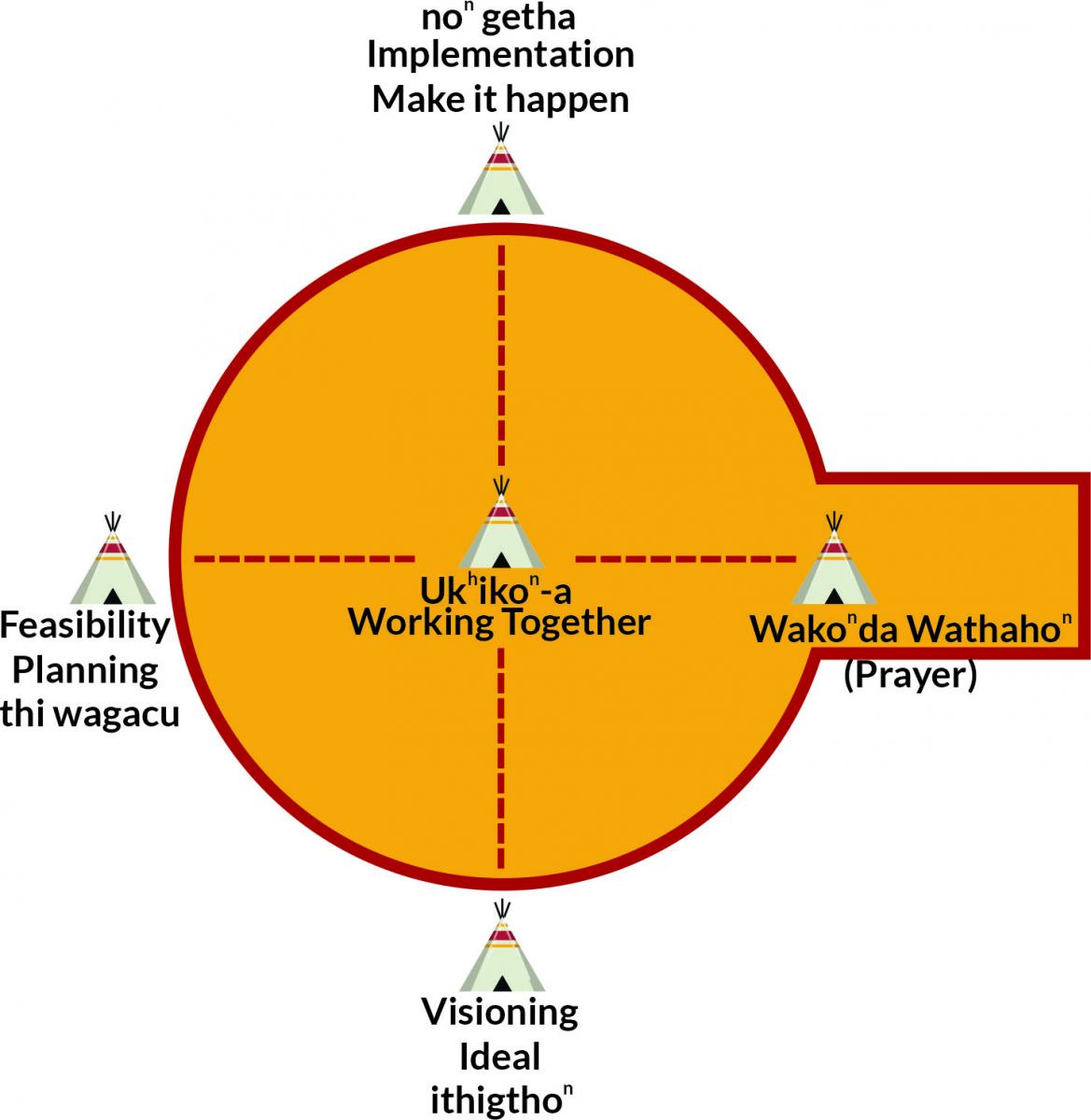
Content
Ukhikon-a (Helping Each Other) Program is exploring cooperatives in the Omaha tribe. The diagram depicts historically how the Omaha tribe planned and worked together to support each other. All things start looking to the east and beginning with prayer.

Ukhikon-a (Helping Each Other) Program evolved from a Nation Nourishment grant that is teaching members of the Omaha tribe how to raise native crops and address food sovereignty. The members are now exploring how to market and be more entrepreneurial in their efforts. Beginning in January 2021, NCDC started meeting with a team of people that included the University of Nebraska tribal liaison (Ted Hibbeler), community member (Barry Webster), tribal cooperative consultant (Pamela Standing), Center for Rural Affairs liaison (Justin Carter), UNL Survey Researcher (Becky Vogt) and UNL Nebraska Cooperative Development Center (Charlotte Narjes). These conversations led to a survey being conducted in the community to understand the interest in cooperatives and food. Funding for the survey was supported by a USDA SDGG Grant to the Center for Rural Affairs and a USDA RCDG Grant to UNL NCDC. Results of the survey showed a strong interest in learning more about cooperatives and an interest in local foods.
Survey Questionnaire and Results
The food assessment was developed using the Food Sovereignty Assessment Tool by First Nations Development Institute. Questions were modified to fit the needs of the Umonhon Nation.Questions topics included: food sources, usefulness of food resources, indigenous cooperatives, health of respondent, collection and uses of traditional foods, and demographics.
Ukhikon Full Report A total of 105 responses were received. Interviewers went door to door to hand out surveys to other households after the kick-off event. Only the person in the household who did most of the food purchasing was encouraged to complete the survey. There are likely instances where multiple members of the same household completed the survey.
Models of Native Cooperative Ownerships
Models of Native Cooperative Ownerships Webinar Series The Center for Rural Affairs hosted a series of webinars highlighting various models of Native cooperative ownership. Pamela Standing, Minnesota Business Alliance, identified the various models and facilitated the conversations.
Dreams of Wild Health The mission of Dream of Wild Health is to restore health and well-being in the Native community by recovering knowledge of and access to healthy Indigenous foods, medicines and lifeways. In this webinar first filmed on July 20 featuring Dream of Wild Health, a 10-acre farm in Hugo, Minnesota, and serves the Minneapolis-St. Paul Twin Cities Native community as an independent 501(c)3 entity. Dream of Wild Health is now working to create and restore an Indigenous relationship with the land and to offer access to healthy foods and lifestyles. They also specialize in youth led programs.
Rez Chicks Fresh Egg Cooperative Rez Chicks Cooperative provides locally produced, all natural fresh eggs to the Umatilla reservation and regional customers. Rez Chicks is located in Pendleton, Oregon. In this webinar first filmed on July 22 featuring Rez Chicks Fresh Eggs Cooperative is based in Pendleton, Oregon. In 2020, just before the pandemic, they began their operation with just a small order of chicks. Learn how they have grown into a successful cooperative driven by Native women.
E'Numu Diip Cooperative Located in Oregon, E'Numu Diip was formed to provide land management assistance to Public Domain Allotment owners. This webinar was first filmed on July 27 featuring E'Numu Diip. E'Numu Diip is giving power to allottees in the state of Oregon. Their cooperative has given Native populations the ability to protect their water rights, steward their land, and practice regenerative agriculture.
Indigenious Farmers Collaborative In this webinar first filmed on July 29 featuring Shannon Kesner, Tribal Liaison and Outreach Coordinator for the Minnesota Dept. of Agriculture, discusses how Indigenous farmers have come together to form a space to discuss barriers and opportunities for Native American producers.
Artz Cooperative The ARTZ Cooperative is the only pueblo Artist owned and operated cooperative in New Mexico. The formation of the Cooperative was founded to give back the power to the artist. To ensure that they receive the full monetary value they ask for. In this webinar first filmed on August 10, 2021, Elroy Natachu Jr and Kandis Quam discuss how they have formed the Ancestral Rich Treasures of Zuni (ARTZ) Cooperative. This grassroots cooperative is deepening the tradition of Zuni arts by providing artists an outlet for sales and educating the public on the authenticity of Zuni art. Elroy and Kandis discuss the foundation of the cooperative, its values, structure, and member roles.
White Corn Producers Cooperative In this webinar first filmed on Sept. 14, the leaders of Ohe∙láku Hutkahuni & Yostayowaluts (Among the Corn Stalks) of Oneida Nation discuss their traditional white corn producers cooperative. They explain how, out of a necessity for this culturally rich food, they began to cultivate white corn themselves. They discuss their structure, growing practices, and climate adaptions. They also introduce a continent wide bartering system that is rooted in the rich traditions of intertribal relations.
Soul Fire Farms In this webinar first filmed on Sept. 28, Leah Penniman, founding co-director and farm manager, of Soul Fire Farms explains their journey towards cooperative land stewardship. How they are feeding the community and reviving afro-indigenous farming methods. Leah shares some of the challenges of beginning a cooperative with modern legal structures. She also discusses partnerships with the Mohican people, the original habitants of the land Soul Fire resides on.
Fond du Lac Band of Lake Superior Chippewa In this webinar first filmed on Sept. 23, Jamie Adams and Erika Legros discuss the Fond du Lac’s gardening programs, including their Gitigaan program. Gitigaan provides trainees with education, supplies, as well as space to grow. Jamie and Erika provide insights on their cooperative structure and they have worked with partners and their tribal government to support Native producers.
Partners
Center for Rural Affairs The Center for Rural Affairs' mission is to establish strong rural communities, social and economic justice, environmental stewardship, and genuine opportunity for all while engaging people in decisions that affect the quality of their lives and the future of their communities.
Minnesota Business Alliance The Minnesota Business Alliance mission is ACT. Align partners. Connect businesses to resources.Transform Native economies, partners and communities committed to the growth and success of native-owned businesses, entrepreneurs and artisans.
University of Nebraska Rural Poll The Nebraska Rural Poll is an annual survey conducted by the UNL Department of Agricultural Economics in partnership with Rural Prosperity Nebraska and Nebraska Extension. The Ukhikon-a survey was conducted by Rural Poll survey manager.
University of Nebraska Native American Coalition The University of Nebraska–Lincoln Native American Coalition (NAC) builds relationships and partnerships between the Nebraska Extension and Native American communities and organizations.
University of Nebraska Cooperative Development Center NCDC assists groups and communities who are exploring a multi-owner effort or have formed a cooperative. NCDC can guide a cooperative effort from visioning to implementation.